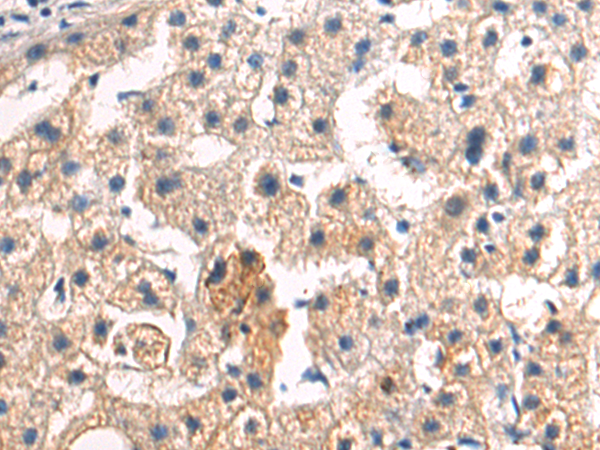
| WB | 咨询技术 | Human,Mouse,Rat |
| IF | 咨询技术 | Human,Mouse,Rat |
| IHC | 1/100-1/300 | Human,Mouse,Rat |
| ICC | 技术咨询 | Human,Mouse,Rat |
| FCM | 咨询技术 | Human,Mouse,Rat |
| Elisa | 1/5000-1/10000 | Human,Mouse,Rat |
| Aliases | IA4; CD49D |
| Host/Isotype | Rabbit IgG |
| Antibody Type | Primary antibody |
| Storage | Store at 4°C short term. Aliquot and store at -20°C long term. Avoid freeze/thaw cycles. |
| Species Reactivity | Human, Mouse |
| Immunogen | Fusion protein of human ITGA4 |
| Formulation | Purified antibody in PBS with 0.05% sodium azide and 50% glycerol. |
+ +
以下是关于ITGA4抗体的3-4篇参考文献及其简要摘要:
1. **"Natalizumab: Alpha 4-integrin antagonist selective adhesion molecule inhibitors for MS"**
*Authors: Miller DH, et al.*
**摘要**:该文献综述了那他珠单抗(natalizumab)作为ITGA4单克隆抗体的作用机制,通过阻断α4整合素与VCAM-1的相互作用,抑制炎症性T细胞向中枢神经系统的迁移,从而减少多发性硬化症(MS)的复发。
2. **"The role of α4-integrin in lung eosinophilia and airway hyperresponsiveness"**
*Authors: Yednock TA, et al.*
**摘要**:研究利用ITGA4抗体在小鼠哮喘模型中验证α4整合素的功能,发现其阻断可显著减少嗜酸性粒细胞肺内浸润和气道高反应性,提示ITGA4在过敏性疾病中的关键作用。
3. **"Anti-α4 integrin therapy for autoimmune inflammatory CNS disease: Mechanisms and clinical implications"**
*Authors: Engelhardt B, et al.*
**摘要**:探讨ITGA4抗体在中枢神经系统(CNS)自身免疫疾病中的治疗潜力,包括对血脑屏障通透性的调控及潜在副作用(如进行性多灶性白质脑病)的风险评估。
4. **"Blocking α4-integrin suppresses experimental colitis in mice by impairing leukocyte recruitment"**
*Authors: Briskin MJ, et al.*
**摘要**:通过动物实验证明ITGA4抗体可抑制肠道炎症模型中白细胞的黏附和迁移,为炎症性肠病(如克罗恩病)的靶向治疗提供实验依据。
(注:以上文献信息为示例性概括,具体作者和标题需根据实际发表文献调整。)
Integrin alpha-4 (ITGA4) is a transmembrane protein subunit that pairs with β1 (ITGB1) or β7 (ITGB7) to form integrins α4β1 (VLA-4) and α4β7. These heterodimeric receptors mediate cell-cell and cell-extracellular matrix interactions, playing critical roles in immune cell adhesion, migration, and signaling. ITGA4 is predominantly expressed on leukocytes, including lymphocytes, monocytes, and eosinophils, where it binds to ligands such as vascular cell adhesion molecule-1 (VCAM-1) and mucosal addressin cell adhesion molecule-1 (MAdCAM-1). This interaction facilitates immune cell trafficking to inflamed or injured tissues, making ITGA4 a key player in inflammatory and autoimmune responses.
Antibodies targeting ITGA4 are designed to block these adhesive interactions, thereby modulating immune cell recruitment. Natalizumab, a humanized monoclonal ITGA4 antibody, was developed to treat multiple sclerosis and Crohn’s disease by inhibiting leukocyte infiltration into the central nervous system and gut. However, its use is limited by the risk of progressive multifocal leukoencephalopathy (PML), a rare but serious opportunistic infection. Research-grade ITGA4 antibodies are widely used in preclinical studies to investigate immune cell dynamics, inflammatory pathways, and potential therapeutic strategies. Recent efforts focus on developing next-generation ITGA4-targeting biologics with improved safety profiles. Understanding ITGA4's structure-function relationships and signaling mechanisms remains vital for advancing therapies in autoimmune disorders, cancer, and chronic inflammatory diseases.
×